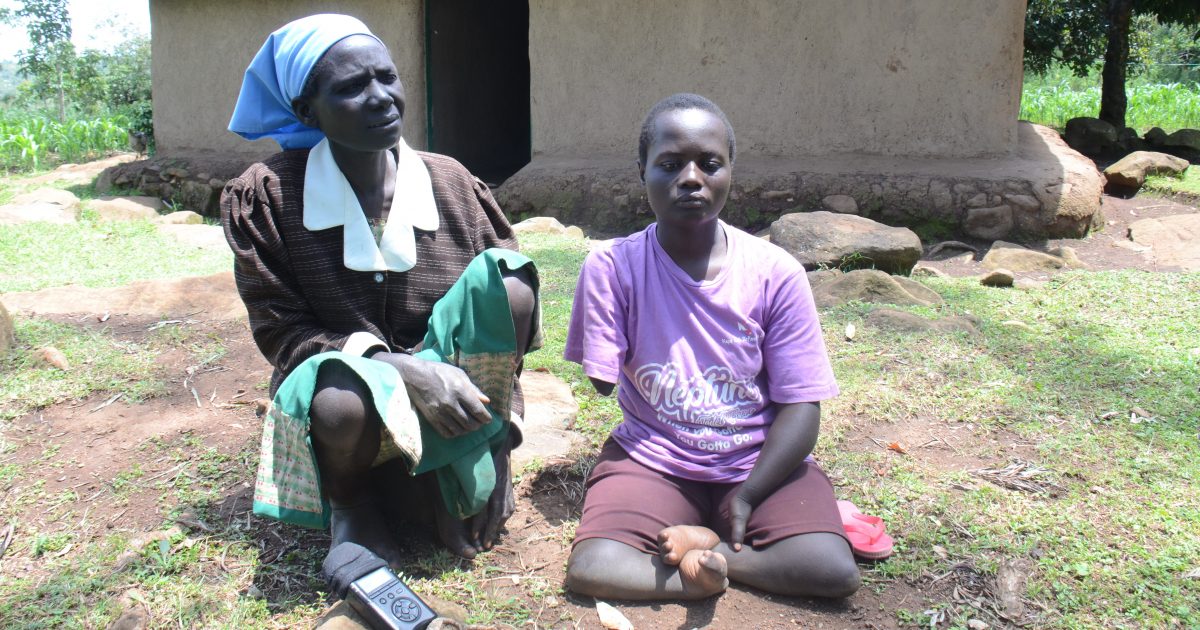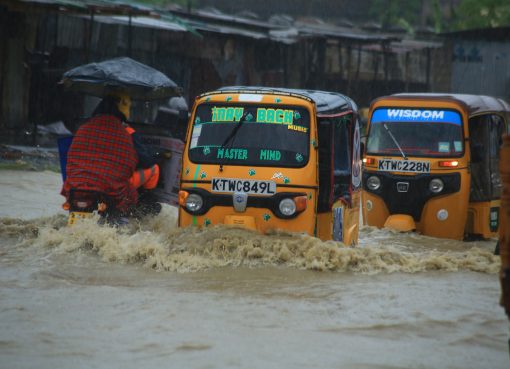All parents remember the excitement that greeted every milestone reached by their new babies, especially the first born.
Some people even have photo albums and diaries with records of their baby’s first smiles, first steps and to some extent first days in school.
Unfortunately for 67-year-old Mama Grace Imari, all she can remember about the 28 years’ lifespan of her first-born daughter, Margaret Ajema, is a spell of unfulfilled dreams, despair and total sufferings.
All Imari’s hopes of living a better life ended immediately she gave birth to Margaret who arrived into this world, a physically challenged child.
The jovial and bright looking disable girl, whose life has since gone full circle of poverty, only moves around by crawling due to her twisted lower limbs. The ever-smiling girl also lacks the full ounce to handle heavy works because of her abnormality in her upper limbs.
Margaret is one among hundreds of persons living with disability who have vowed not to be deterred by their physical impairments. Born without limbs, Margaret is determined to beat all odds and become the sole rescuer of her poor family.
“My condition will not shatter my urge to uplift my family,” vowed Margaret during an interview with the Kenya News Agency (KNA) recently.
At the moment, as established by KNA, her ailing mother and young sister are fully dependent on her. Unbelievably of her condition though, Margaret is able to cook, wash clothes, clean utensils, receive and make calls easily on her cheap phone without much ado.
However, Margaret still has to be helped to bathe, dress up and do other house and personal chores by her sickly mother and siblings.
According to her mother, Margaret was born in that condition in 1994. Since then, it has not been easy raising her as she required a lot of support and attention which she could not get.
“I gave birth to Margaret in her condition. Life has never been easy ever since as I had to work extra hard to take care of her. I faced a lot of challenges because I had no formal employment,” said Mrs. Imari
The first-born in a family of four children, three girls and a boy- Margaret who did her fourth form at St. Georges Secondary School for the physically challenged persons in Nyakach, Kisumu County, scored a D+ in her Kenya Certificate of Secondary Education (KCSE) examinations, wiping away all her hopes of taking up the full responsibility of fending for the family.
Her dream of becoming a high Court Judge in Kenya was all washed away after performing poorly in the exams. “I had all along dreamt of being a High Court Judge in Kenya to help deal with the many injustices happening in Kenya and especially those peddled against persons living with disabilities,” she told the KNA crew who visited her home in Suna East Constituency, Migori County.
Nevertheless, Margaret is still a spirited and determined soul that one day she will meet someone who will open college doors for her to pursue any course that will help her raise her son and also support her ailing family.
Amidst the hardships Margaret and her family face, she is so determined on doing things for herself in helping the family and at the moment she is the breadwinner for her mother and younger sister, who is set to sit for her KCPE exams.
The family lives in Nyahera village, about 30kms from Migori town and, their ramshackle single living house is enough proof that mama Imari and her children lead a poverty ravaged life.
Things turned worse when Margaret’s father, Mr. Tinael Misoga, passed on in 2006 leaving her wife with four children and no job. With no formal employment and a small piece of land for cultivation, Mrs. Imari has since been forced to do manual labour on other people’s farms to fend for her children.
Life has not gone well for mama Imari as she has been on and off hospital after developing chest problems due to heavy manual labour of working for other people. At times she is forced to beg for food from the neighbours to give her children when she cannot handle the manual jobs due to sickness.
Her only wish is that some well-wisher can sponsor her daughter Margaret to college to learn a skill that can help her earn a living rather than begging people from time to time.
“After my husband passed on, I have been working as a manual laborer to feed my children. In the long run, it left me with a chest problem and currently I am grounded. If I don’t beg, I depend on my daughter who is disabled,” said Margaret’s mother.
Compounding the misery in the family history is the fact that Margaret herself has one boy child to take care of. The boy is also physically challenged like her mother Margaret, nursing a deformed leg.
She gave birth to the lame child while still in school after a man lured her to an illicit sex escapade to the chagrin of the family members and the local villagers.
The boy who could not be fended for properly by her mother and grandmother is currently under the care of a local orphanage home and attends school at the Kenya Relief Academy within the outskirts of Migori town.
“I gave birth to my son while I was very young. I wanted to be with my child and see him grow and walk in my arms, something I cannot do. But I had to let him go after three months because I had no means of taking care of him,” she remorsefully narrated.
Despite her wish to be with her son, who is now eleven years old, Margaret is grateful for the well-wishers from the Kenya Relief Organization.
The organization has taken full responsibility of educating her son and allowing him to visit home every holiday when schools are closed
When Inua Jamii cash transfers and disability funds came in, it gave hope to many who are unable to fend for themselves like Margret. She has been a beneficiary of this program where she has been receiving Shs8,000 after every four months.
However, she laments the delayed remittance of such funds from the ministry as sometimes it takes months before they receive the support. This leaves her and her family in a devastating state. “Mostly I rely on disability funds to fend for my mother and sister. Sometimes it delays which forces me to seek other solutions like begging from people,” decried Margaret.
According to her, the last remittance they received was on June 2022.
Apart from financial support, Margaret also wishes for a wheelchair to improve her mobility adding she could also find simple jobs and earn a living.
“My main challenge is movement. The roads leading to my home are rocky and after crawling for long hours I feel a lot of pain. With a wheelchair I can move easily and reach places where I can get help,” she narrates.
An interview with an orthopedic expert Amos Odhiambo who has been treating Margaret and has an insight of the family history revealed that the family suffers a hereditary health problem.
The problem manifests well in first born children within the family lineage, he said, explaining that Margaret is first born, her son who is lame is firstborn, her father who was also lame was first born and her step-mother who died long time ago gave birth to a disabled first-born son.
According to Odhiambo, who works at Migori Teaching and Referral Hospital (MTRH), Margaret’s condition is referred to as congenital malformations. This is a condition where the patient has defects or abnormalities in the body that develop during pregnancy.
The condition is caused by genetic or chromosomal abnormalities, environmental factors such as exposure to toxins, and maternal health during pregnancy.
Mr. Odhiambo states that the condition can only be rectified at birth or before the baby reach five years. Although, the medical operation can only be done to help the patient to stand but not develop undeveloped limbs when the patient has none.
Gabriel Omondi, who is a physiotherapist at MTRH states that expectant mothers should routinely visit maternal and child health clinics and not buy drugs over counters. This is to assist them to avoid conditions that could lead to or bring gross disability.
“One of the main causes of such anomalies is that most of the mothers are not able to access medical facilities due to lack of funds or distance and end up buying over-counter drugs from quacks and even from traditional healers,” he said.
The end results can be dangerous because they use unregulated medication that eventually leads to the malformations we are talking about, he explained.
Although Mr. Omondi regrettably notes that in an instance where the ultrasound conducted on pregnant mothers reveals the disability of the unborn, the technology they have is not high tech that can rectify the deformity. This is possible in developed countries.
By George Agimba and Polycarp Ochieng’




